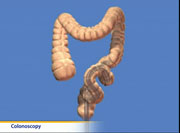
Irritable Bowel Syndrome
What is irritable bowel syndrome?
Irritable bowel syndrome (IBS) is a chronic (long-lasting) disorder of the large intestine. (The large intestine is also called the colon or bowel.) IBS is not a disease. It's a condition in which the bowel does not always work normally. Although IBS can cause much distress, it does not damage the bowel and does not lead to life-threatening illness.
What causes IBS?
The cause of IBS is not well understood. Changes in the nerves and muscles in the bowel or in the central nervous system may be a cause. For example, the nerves in the bowel may make the muscles contract too much when your child eats. These contractions can make food move too fast through the intestines, causing gas, bloating, cramping, and diarrhea. In other cases abnormal contractions may slow the passage of food and delay bowel movements, causing cramps and constipation.
Some foods may trigger attacks. Sometimes the symptoms of IBS may be caused by intestinal gas or an illness such as stomach flu. Other possible triggers of attacks are hormonal changes, emotional stress, or depression.
Girls are affected by the disorder slightly more often than boys. IBS seem to occur more often in families where a parent has the disorder.
What are the symptoms?
Irritable bowel syndrome in children tends to produce mainly diarrhea or pain, depending on the age of the child. Symptoms may include:
- a feeling of fullness in the rectum
- constipation
- diarrhea
- dizziness
- gas and bloating
- headaches
- nausea
- stomach cramps that come and go
- urgent need to have a bowel movement.
Sometimes children may eat less to avoid the pain. This may cause them to lose weight. Children who often have diarrhea may not want to go to school or be around other children. Children with IBS can become depressed or anxious.
How is it diagnosed?
Your child's healthcare provider will review your child's medical history, examine the abdomen and may do a rectal exam. Tests that your child may have include:
- blood tests to check if your child is anemic, has an infection, or is sensitive to gluten (found in wheat products)
- urinalysis to check for urinary tract infections
- stool sample to check for bacteria and parasites that could cause diarrhea
- lactose breath hydrogen test to check if your child is sensitive to lactose, a sugar in milk and milk products
- colonoscopy, using a thin, flexible tube with a light to examine inside the large intestine.
How is it treated?
There is no cure for IBS. However, controlling the diet and managing stress usually relieves the symptoms. Some medicines may also help.
Diet
Try having your child eat smaller meals more often. Avoid foods that cause gas, such as cabbage. Other foods that may cause symptoms are:
- fatty foods, such as French fries
- milk products, such as cheese or ice cream
- chocolate
- sodas or other drinks with caffeine
Increasing the fiber in the diet often helps, although sometimes a decrease in fiber is needed. If you do increase fiber, it must be done carefully since it could cause painful gas and bloating. More fiber may be recommended if your child mainly has constipation. For children two years of age and older, use the following guideline: The child's age plus five equals the number of grams of fiber that should be eaten daily. For example, a 3 year old needs 3 + 5 grams per day = 8 grams of fiber per day. Here are some easy ways to increase fiber in your child's diet:
- Serve more raw vegetables and fruits with dip.
- Add high-fiber cereal or fruit to ice cream, frozen yogurt, or yogurt.
- Add beans or peas to soups, stews, and salads.
- Use whole wheat bread for sandwiches.
Stress
Help your child identify things that cause stress and suggest ways to help control them. Relaxation or biofeedback techniques may help your child manage stress. Talk with your child's teacher about ways the school can help.
Medicines
If symptoms are severe, your child's provider may prescribe:
- Fiber supplements such as bran or methylcellulose
- Antispasmodic drugs to slow contractions in the bowel and help with diarrhea and pain
- Medicines to help control pain.
How can I take care of my child?
- Follow your healthcare provider's recommendations.
- Help your child learn ways to reduce stress and anxiety. Professional counseling may be helpful.
- Your child should exercise regularly. Exercise helps keep bowel movements regular.
- Make sure your child drinks plenty of water.
- If your child is lactose intolerant, limiting milk products or taking lactase or Lactaid to help digest the enzyme may help.
- Ask your healthcare provider if your child should eat a high-fiber diet or if you should use a nonprescription fiber supplement.
- Encourage your child to eat smaller meals more often. For example, 6 small meals a day rather than 3 large ones.
- See your healthcare provider if your child's symptoms are getting worse or he is having them more often.

